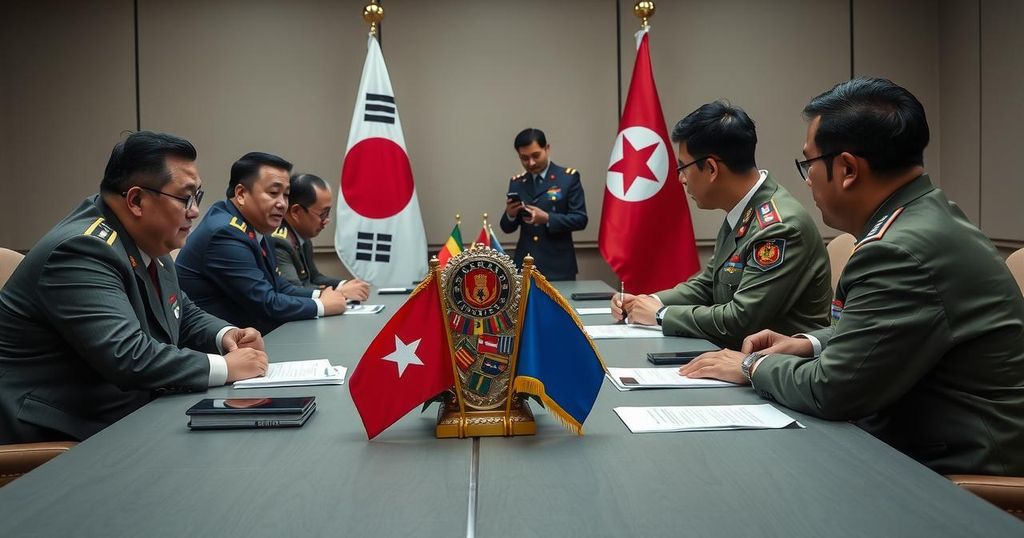Zelensky Proposes Exchange of North Korean Soldiers for Ukrainian POWs

Ukrainian President Volodymyr Zelensky has proposed exchanging two captured North Korean soldiers for Ukrainian prisoners in Russia. He indicated potential alternatives for those North Korean troops unwilling to return, particularly if they opt to communicate the realities of the conflict. The captured soldiers are under medical care and being interrogated with South Korean assistance. Zelensky emphasized Russia’s attempts to disguise the soldiers’ identities and highlighted the increasing dependence of the Russian military on North Korean support in the ongoing conflict.
Ukrainian President Volodymyr Zelensky has expressed a willingness to exchange two North Korean soldiers captured in Ukraine for Ukrainian prisoners held in Russia. He stated on social media that for those North Korean troops who wish to stay, alternative choices would be made available, particularly for those willing to disseminate truthful narratives about the ongoing conflict in their native language. Ukraine reported that these soldiers were apprehended on January 9 and are currently receiving medical attention in Kyiv, assisted by the South Korean National Intelligence Service due to their language barrier.
Photos shared by Zelensky depict the injured North Korean soldiers, accentuating a red Russian military card belonging to one soldier that indicated his place of birth as Turan, located in Russia’s Tuva Republic. Reports from the Security Service of Ukraine (SBU) divulged that one soldier possessed a Russian military ID card, which was issued under another individual’s name linked to Tuva, while his companion was without documentation. Interrogations revealed that one soldier claimed his documentation was issued in Russia during the fall of 2024, asserting he intended to undergo interoperability training rather than participate in combat against Ukraine.
Zelensky’s office highlighted that Russia is attempting to misrepresent these soldiers’ identities by producing falsified documents indicating they are from regions within Moscow’s jurisdiction. The intelligence service further disclosed that one soldier, who had been serving as a rifleman since 2021, was born in 2005, while another, with an injured jaw who answered inquiries in writing, was believed to be a scout sniper born in 1999, serving since 2016. Ukraine and South Korea had previously indicated that North Korea supplied at least 10,000 troops to Russia, with reports of substantial casualties among these forces.
The situation surrounding the captured North Korean soldiers has heightened scrutiny regarding Russia’s reliance on military support from North Korea, with both Ukrainian and South Korean intelligence pointing towards a significant international dimension to the conflict.
The backdrop to this situation reveals a complex web of international relations involving Ukraine, North Korea, and Russia amid the ongoing conflict initiated by Russia’s invasion of Ukraine. Reports indicate that North Korea has sent a considerable number of military personnel to support Russia, sparking concerns about the implications of such alliances. The utilization of foreign troops by Russia suggests a level of desperation and dependence on external military resources, highlighting the broader geopolitical dynamics at play, which includes potential human rights implications of employing foreign soldiers in combat. Zelensky’s willingness to negotiate the return of the captured North Korean soldiers reflects Ukraine’s strategy to leverage the situation for the benefit of their own captured personnel, while also navigating diplomatic relations with South Korea concerning the presence of their citizens in North Korea’s ranks. The Geneva Convention, which governs the treatment of prisoners of war, underscores the importance of proper interrogation procedures and humane treatment, reinforcing the need for compliance with established international law, particularly concerning language barriers and protection against exploitation.
In conclusion, President Zelensky’s proposal for the exchange of captured North Korean soldiers for Ukrainian prisoners of war underscores the intricacies of international diplomacy amid the ongoing war in Ukraine. The situation sheds light on Russia’s reliance on North Korean military support, raising urgent questions about human rights and international law regarding the treatment of foreign soldiers. This unfolding scenario not only impacts the immediate parties involved but also has broader implications for geopolitical alliances and the humanitarian aspects of warfare.
Original Source: www.bbc.co.uk







